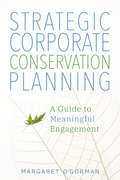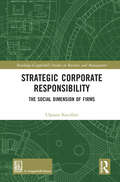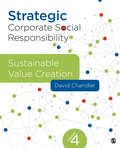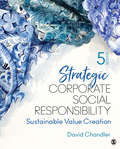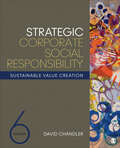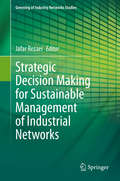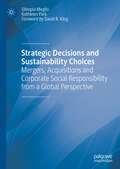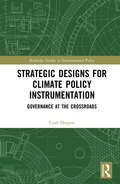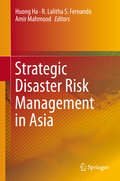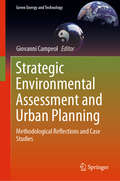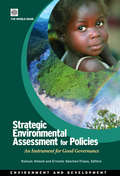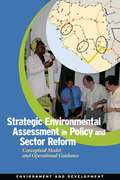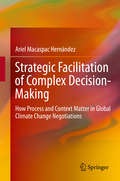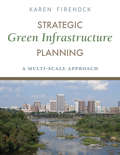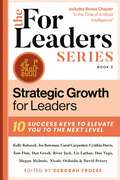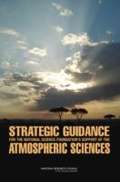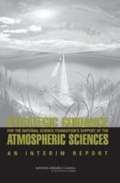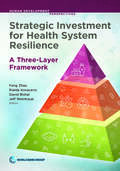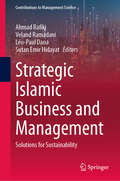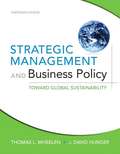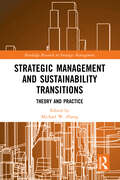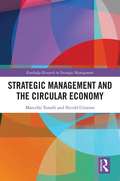- Table View
- List View
Strategic Corporate Conservation Planning: A Guide to Meaningful Engagement
by Margaret O'GormanIndustries that drive economic growth and support our comfortable modern lifestyles have exploited natural resources to do so. But now there's growing understanding that business can benefit from a better relationship with the environment. Leading corporations have begun to leverage nature-based remediation, restoration, and enhanced lands management to meet a variety of business needs, such as increasing employee engagement and establishing key performance indicators for reporting and disclosures. Strategic Corporate Conservation Planning offers fresh insights for corporations and environmental groups looking to create mutually beneficial partnerships that use conservation action to address business challenges and realize meaningful environmental outcomes. Myriad case studies featuring programs from habitat restoration to environmental educational initiatives at companies like Bridgestone USA, General Motors, and CRH Americas are included to help spark new ideas.
Strategic Corporate Responsibility: The Social Dimension of Firms (Routledge-Giappichelli Studies in Business and Management)
by Ulpiana KocollariIn her book, Dr Ulpiana Kocollari presents a unique contribution to the debate on Corporate Social Responsibility and Sustainability by clearly expressing how the configuration of a firm’s social dimension can help identify inclusive corporate governance models, define innovative management processes and reshape performance measurement systems for the evaluation and assessment of sustainable economic, social and environmental results. Moving a step further, a firm’s social dimension is defined within the configuration of stakeholders – resources – rewards patterns intrinsic to their interactions with their environment and embedded in their business activities. Based on this approach, a framework is provided to guide firms in identifying management activities grounded in and suited to their prevalent patterns, in order to support current and future strategies and establish adequate measurement and communication tools for pursuing their mission. The book contains original theoretical and empirical material and particular attention is paid to the principal social and environmental impact measurement models (i.e. Global Reporting Initiative, Social Return on Investments, Social Balanced Scorecard, etc.), analysing their main features in order to pinpoint their adequacy in assessing the social dimension and to tailor their use more closely to the specific patterns to which they refer. Finally, a detailed application of the analysis framework, which the author has identified is proposed for Innovative Start-Ups with a Social Goal and for Benefit Corporations, in order to detect the patterns embedded in their social dimension and their distinctive traits, which influence their management and measurement processes.
Strategic Corporate Social Responsibility: Sustainable Value Creation
by David ChandlerStrategic Corporate Social Responsibility: Sustainable Value Creation redefines corporate social responsibility (CSR) as being central to the value-creating purpose of the firm. Based on a theory of empowered stakeholders, this bestselling text argues that the ‘responsibility’ of a corporation is to create value, broadly defined. In this new Fourth Edition, author David Chandler explores why some firms are better at CSR and how other firms can improve their CSR efforts. Keep your course content up-to-date! Subscribe to David Chandler's 'CSR Newsletters' by e-mailing him at david.chandler@ucdenver.edu. The newsletters are designed to be a dynamic complement to the text that can be used for in-class discussion and debate. Past newsletters are archived as a freely-available resource for instructors and students at: http://strategiccsr-sage.blogspot.com/
Strategic Corporate Social Responsibility: Sustainable Value Creation
by David ChandlerStrategic Corporate Social Responsibility: Sustainable Value Creation redefines corporate social responsibility (CSR) as being central to the value-creating purpose of the firm. Based on a theory of empowered stakeholders, this bestselling text argues that the ‘responsibility’ of a corporation is to create value, broadly defined. In this new Fourth Edition, author David Chandler explores why some firms are better at CSR and how other firms can improve their CSR efforts. Keep your course content up-to-date! Subscribe to David Chandler's 'CSR Newsletters' by e-mailing him at david.chandler@ucdenver.edu. The newsletters are designed to be a dynamic complement to the text that can be used for in-class discussion and debate. Past newsletters are archived as a freely-available resource for instructors and students at: http://strategiccsr-sage.blogspot.com/
Strategic Corporate Social Responsibility: Sustainable Value Creation
by David ChandlerA holistic perspective for navigating and exploring the CSR landscape. Strategic Corporate Social Responsibility: Sustainable Value Creation, Fifth Edition, redefines corporate social responsibility (CSR) as being central to the value-creating purpose of the firm and provides a framework that firms can use to navigate the complex and dynamic business landscape. Based on a theory of empowered stakeholders, this bestselling text argues that the responsibility of a corporation is to create value, broadly defined. The primary challenge for managers today is to balance the competing interests of the firm’s stakeholders, understanding that what they expect today may not be what they will expect tomorrow. This tension is what makes CSR so complex and demanding, but it is also what makes CSR integral to the firm’s strategy and day-to-day operations. The new edition includes the latest research, new cases, a streamlined table of contents, and expanded emphasis on the legal perspective of strategic CSR. Keep your course content up-to-date! Subscribe to David Chandler's 'CSR Newsletters' by e-mailing him at david.chandler@ucdenver.edu. The newsletters are designed to be a dynamic complement to the text that can be used for in-class discussion and debate. Past newsletters are archived as a freely-available resource for instructors and students at: http://strategiccsr-sage.blogspot.com/
Strategic Corporate Social Responsibility: Sustainable Value Creation
by David ChandlerA holistic perspective for navigating and exploring the CSR landscape. Strategic Corporate Social Responsibility: Sustainable Value Creation, Fifth Edition, redefines corporate social responsibility (CSR) as being central to the value-creating purpose of the firm and provides a framework that firms can use to navigate the complex and dynamic business landscape. Based on a theory of empowered stakeholders, this bestselling text argues that the responsibility of a corporation is to create value, broadly defined. The primary challenge for managers today is to balance the competing interests of the firm’s stakeholders, understanding that what they expect today may not be what they will expect tomorrow. This tension is what makes CSR so complex and demanding, but it is also what makes CSR integral to the firm’s strategy and day-to-day operations. The new edition includes the latest research, new cases, a streamlined table of contents, and expanded emphasis on the legal perspective of strategic CSR. Keep your course content up-to-date! Subscribe to David Chandler's 'CSR Newsletters' by e-mailing him at david.chandler@ucdenver.edu. The newsletters are designed to be a dynamic complement to the text that can be used for in-class discussion and debate. Past newsletters are archived as a freely-available resource for instructors and students at: http://strategiccsr-sage.blogspot.com/
Strategic Corporate Social Responsibility: Sustainable Value Creation
by David ChandlerStrategic Corporate Social Responsibility: Sustainable Value Creation (Sixth Edition) redefines corporate social responsibility (CSR) as being central to the value-creating purpose of the firm. Based on a theory of empowered stakeholders, this bestselling text argues that the responsibility of a corporation is to create value, broadly defined. The primary challenge for managers today is to balance the competing interests of the firm’s stakeholders’ understanding that what they expect today may not be what they will expect tomorrow. This tension is what makes CSR so complex and demanding, but it is also what makes CSR integral to the firm’s strategy and day-to-day operations. In this new Sixth Edition, author David Chandler explores issues around COVID-19, the BLM movement, the supply chain crunch, and the "great resignation."
Strategic Corporate Social Responsibility: Sustainable Value Creation
by David ChandlerStrategic Corporate Social Responsibility: Sustainable Value Creation (Sixth Edition) redefines corporate social responsibility (CSR) as being central to the value-creating purpose of the firm. Based on a theory of empowered stakeholders, this bestselling text argues that the responsibility of a corporation is to create value, broadly defined. The primary challenge for managers today is to balance the competing interests of the firm’s stakeholders’ understanding that what they expect today may not be what they will expect tomorrow. This tension is what makes CSR so complex and demanding, but it is also what makes CSR integral to the firm’s strategy and day-to-day operations. In this new Sixth Edition, author David Chandler explores issues around COVID-19, the BLM movement, the supply chain crunch, and the "great resignation."
Strategic Decision Making for Sustainable Management of Industrial Networks (Greening of Industry Networks Studies #8)
by Jafar RezaeiThis book presents a diverse set of decision-making methodologies to solve some of the most important decisions that most organizations face today. It is an excellent demonstration of some great challenges in our society in the area of sustainability. These great challenges, ranging from sustainability in logistics to the use of renewable energies, needs to be urgently addressed. Sustainability has become one of the most important topics in management and many organizations are taking big steps towards sustainability. Organizations are attempting to use cleaner production technologies and renewable energies sources, to improve health and safety issues within their industries and the products and services they offer. These points involve several important strategic and managerial decisions, highlighted in this book. The book can be used by decision-makers and policy-makers as exemplary guidelines to solve sustainability problems.
Strategic Decisions and Sustainability Choices: Mergers, Acquisitions and Corporate Social Responsibility from a Global Perspective
by Olimpia Meglio Kathleen ParkThis book integrates two different but equally prominent themes in the management field: mergers and acquisitions (M&As) and corporate social responsibility (CSR). It explores questions such as whether strategic goals overlap or conflict with sustainability choices, what the strategic and sustainability tensions are confronting expanding companies, and whether these companies can grow and be socially responsible for a variety of stakeholders. The authors provide a fresh perspective on the study of acquisitions, aiming to inspire the M&A field and using examples from different global and institutional contexts in both developed and developing economies. This ground-breaking book addresses the gap that has existed between acquisitions on the one hand and social responsibility and sustainability on the other, for an integrative perspective on enacting M&As and achieving the triple people-planet-profits bottom line.
Strategic Designs for Climate Policy Instrumentation: Governance at the Crossroads (Routledge Studies in Environmental Policy)
by Gjalt HuppesThis book provides insight into the development of effective climate policy instrumentation in two divergent and mutually exclusive directions. Examining the role of political philosophies, the book explains why current climate policy is ineffective and unable to halt rapidly rising atmospheric concentrations of CO2, and suggests strategies for ending the current stalemate in climate governance. Drawing on examples from real-world case studies and challenges, the author first sets out an instrumentation approach based on a command and control strategy which involves identifying the technologies and behavior key to meeting the required emissions reductions, such as energy efficient homes and zero-emission cars. The second strategy concerns institutional rearrangement, creating incentives and options which will allow for decentralized climate action. This approach would transform and strengthen current emission trading systems, such as the EU ETS, into a price stabilized system covering all fossil fuels, and ultimately as an emission tax, as well as creating an open electricity market. These approaches not only highlight that fundamental changes in climate policy instrumentation are now vital, but that consistent strategies such as those laid out by the author are necessary if we are to avoid costly and ineffective alternatives. Exploring key issues such as the relationship between instrumentation and broader political philosophy, as well as applying a systems oriented design methodology for effective instrumentation, this book will be of great relevance to scholars and policy makers with an interest in climate change and environmental politics.
Strategic Disaster Risk Management in Asia
by Huong Ha R. Lalitha S. Fernando Amir MahmoodThis book presents strategies for managing disasters and reducing risks in Asian countries. Given the dynamic changes in the natural environment as well as the patterns of land use and management, the growing populations of the developing nations in Asia, migration patterns, and other social-cultural aspects, the impacts of disasters have increased manifold in Asian countries. Against this backdrop, the book examines disaster management issues such as disaster preparedness, post-disaster reconstruction, peace, development and corruption. The views of different groups of stakeholders are incorporated in the discussion to ensure a comprehensive analysis of and findings on the governance process, as well as best practices in pre- and post-disaster management. The book also includes chapters focusing on aspects often overlooked in the context of disaster management, such as the need to invest in public education to improve public awareness, and approaches to supporting the disabled, the vulnerable and the elderly from disaster risks. In closing, the book presents research on disaster management methods employed by different countries in the Asian region. Acknowledgement: The editors acknowledge the role of the Network of Asia Pacific Schools and Institutes of Public Administration and Governance (NAPSIPAG), which is the largest governance research network in the Asia Pacific region,in bringing out this book. NAPSIPAG has been regularly organizing international meetings of administrators, academia and non-state bodies to provide a forum to the regional scholars to deliberate with the international governance experts. It has also helped the international policy organizations to have a better understanding about the region through a local lens of Asiatic anthropology, ethnography and culture of administration.
Strategic Environmental Assessment and Urban Planning: Methodological Reflections and Case Studies (Green Energy and Technology)
by Giovanni CampeolThis volume gathers a selection of research contributions on Strategic Environmental Assessment (SEA), including theoretical and methodological studies and real-world case studies. It sheds new light on the respective steps in the procedure defined in the SEA Directive from theoretical and operational standpoints, intended to enhance the sustainability of plans and programmes adopted by local, regional and national authorities. Improving the legitimacy and transparency of decision-making in the field of environmental management was one of the goals that led the European Commission (EU) to adopt Directive 2001/42/EC on the assessment of environmental programmes’ effects. This book provides a multidisciplinary approach to SEA, and addresses the demand for policies and strategies to strengthen resilience through concrete measures to reduce energy consumption, mitigate pollution, promote social inclusion and create urban identity.
Strategic Environmental Assessment for Policies
by Kulsum Ahmed Ernesto Sanchez-TrianaEnvironmentally and socially sustainable policies are essential for good governance. Strategic Environmental Assessment (SEA) is the key tool for integrating environmental considerations into policies, programs and plans. This book focuses on SEA applied to policies. Through lessons learned from previous use of SEA on policies, it draws lessons on the strengths and weaknesses of current SEA methodology. It then goes on to analyze how policies are formulated and implemented and proposes a new conceptual framework for conducting SEA of policies thatpotentially could be more useful in influencing decision makers to integrate environmental sustainability considerations into policy formulation and implementation.
Strategic Environmental Assessment in Policy and Sector Reform
by World Bank The University of Gothenburg The Netherlands Commission for Environmental Assessment Swedish University of Agricultural SciencesThis book presents the findings and recommendations of the evaluation of the World Bank's Strategic Environmental Assessment (SEA) Pilot Program. It shows that SEA can contribute to improving development policy and sector reform by calling attention to environmental and social priorities, strengthening constituencies, enhancing policy capacities, and improving social accountability. It also provides guidance for undertaking SEA in policy and sector reform. Although it acknowledges the need for tailoring SEA to the context of specific sectors and countries, the book discusses in detail-and illustrates with examples-the analytical work and participatory processes required for effective SEA at the policy level. It suggests that the time is ripe for scaling up SEA in development policy and sector reform and recommends the establishment of a global alliance on environmental and climate change mainstreaming to support developing countries' efforts for achieving sustainable development. The book concludes by arguing that SEA applied to sector reform and development policy is a critical step for these efforts to be successful. This title responds to demand for SEA approaches at the policy level from policymakers, development and environmental specialists of bilateral and multilateral institutions, and environmental assessment specialists. This publication is the result of joint work by the Environment Department of the World Bank, the Environmental Economics Unit at the Department of Economics of the University of Gothenburg (EEU), the Swedish EIA Centre at the Swedish University of Agricultural Sciences, and the Netherlands Commission for Environmental Assessment (NCEA.) In line with the Paris Declaration on Aid Effectiveness, the book also contributes to harmonization of SEA approaches by the donor community that is led by the SEA Task Team of the OECD Development Assistance Committee.
Strategic Facilitation of Complex Decision-Making
by Ariel Macaspac HernándezThis book provides theoretical and practical insights for effective decision making in situations that involve various types of conflict cleavages. Embedding historical analysis, negotiation analysis, political scientific analysis and game theoretical analysis in an integrated analytical framework allows a comprehensive perspective on various dilemmas and self-enforcing dynamics that inhibit decision making. The conceptualization of strategic facilitation highlights the value of leadership, chairmanship and the role of threshold states in facilitating decision making as the global climate change negotiations unfolds.
Strategic Green Infrastructure Planning: A Multi-Scale Approach
by Karen FirehockFrom New York City's urban forest and farmland in Virginia to the vast Sonoran Desert of Arizona and riverside parks in Vancouver, Washington, green infrastructure is becoming a priority for cities, counties, and states across America. Recognition of the need to manage our natural assets--trees, soils, water, and habitats--as part of our green infrastructure is vital to creating livable places and healthful landscapes. But the land management decisions about how to create plans, where to invest money, and how to get the most from these investments are complex, influenced by differing landscapes, goals, and stakeholders. Strategic Green Infrastructure Planning addresses the nuts and bolts of planning and preserving natural assets at a variety of scales--from dense urban environments to scenic rural landscapes. A practical guide to creating effective and well-crafted plans and then implementing them, the book presents a six-step process developed and field-tested by the Green Infrastructure Center in Charlottesville, Virginia. Well-organized chapters explain how each step, from setting goals to implementing opportunities, can be applied to a variety of scenarios, customizable to the reader's target geographical location. Chapters draw on a diverse group of case studies, from the arid open spaces of the Sonoran Desert to the streets of Jersey City. Abundant full color maps, photographs, and illustrations complement the text. For planners, elected officials, developers, conservationists, and others interested in the creation and maintenance of open space lands and urban green infrastructure projects or promoting a healthy economy, this book offers a comprehensive yet flexible approach to conceiving, refining, and implementing successful projects.
Strategic Growth for Leaders: 10 Success Keys to Elevate You to the Next Level (For Leaders Series #2)
by Indigo River PublishingStrategic Growth for Leaders: 10 Success Keys to Elevate You to the Next Level is the second volume of the For Leaders Series.As new technologies expand and converge, we witness industry, connectivity, and innovation advance at accelerating rates. The emergence of generative AI, specifically, raises questions about the future of human agency. Add to that, the scale of global tension environmentally, economically, and politically—never mind residual effects of the COVID-19 pandemic—are upending the world as we know it. No matter how worthy the product or service you offer, strategic growth is essential to keep pace with change and extend your reach. To help you do that, Strategic Growth for Leaders, Volume 2 in the For Leaders series, is here. With chapters of insight from 10 successful leaders and a bonus chapter demystifying our relationship with AI, Strategic Growth For Leaders is an important tool for navigating this new era. The contents explore methods of approaching change through deeper self-awareness; more finely-tuned business practices; building solid, authentic relationships with employees and clientele; and knowing when enough is enough. It is a must-read for anyone who wants to improve their strategies for growth.
Strategic Guidance For The National Science Foundation's Support Of The Atmospheric Sciences
by National Research Council of the National AcademiesThe National Science Foundation’s Division of Atmospheric Sciences (ATM) supports research to develop new understanding of Earth’s atmosphere and how the Sun impacts it. Strategic Guidance for the National Science Foundation's Support of the Atmospheric Sciences provides guidance to ATM on its strategy for achieving its goals in the atmospheric sciences, including cutting-edge research, education and workforce development, service to society, computational and observational objectives, and data management. The report reviews how the atmospheric sciences have evolved over the past several decades and analyzes the strengths and limitations of the various modes of support employed by ATM. It concludes that ATM is operating in an environment that is ever more cross-disciplinary, interagency, and international, making a more strategic approach necessary to manage activities in a way that actively engages the atmospheric sciences community. At the same time, ATM should preserve opportunities for basic research, especially projects that are high risk, potentially transformative, or unlikely to be supported by other government agencies. Finally, ATM needs to be more proactive in attracting highly talented students to the atmospheric sciences as an investment in the ability to make future breakthroughs.
Strategic Guidance For The National Science Foundation's Support Of The Atmospheric Sciences: An Interim Report
by National Research Council of the National AcademiesThe National Science Foundation's Division of Atmospheric Sciences (ATM) supports research to develop new understanding of the Earth's atmosphere and how the Sun impacts it. Strategic Guidance for the National Science Foundation's Support of the Atmospheric Sciences: An Interim Report provides preliminary guidance to ATM on its strategy for achieving its goals in the atmospheric sciences, including cutting-edge research, education, and workforce development; service to society; computational and observational objectives; and data management. The book reviews how the atmospheric sciences have evolved over the past several decades and analyzes the strengths and limitations of the various modes of support employed by ATM, such as principal investigator grants, small and large centers, and cooperative agreements to support observing or computational facilities. Based on this preliminary analysis, the book concludes that the current support reflects the current needs of the community. Given the changing research environment for the atmospheric sciences, the book recommends that ATM engage the community in the development of a strategic plan to enable determination of the appropriate balance of activities and modes of support into the future. A strategic planning process will also help ATM plan for large or long-term investments; facilitate appropriate allocation of resources to cross-disciplinary, interagency, and international research efforts; ensure that the United States will continue to be a leader in atmospheric research; and enhance the transparency of the rationale behind ATM decisions.
Strategic Investment for Health System Resilience: A Three-Layer Framework (Human Development Perspectives)
by Feng Zhao David Bishai Jeff Weintraub Rialda KovacevicAs efforts to build emergency-ready health systems intensify across the globe, Strategic Investment for Health System Resilience: A Three-Layer Framework provides a practical investment framework and a diverse set of country cases to inform decision-making and strategic resource allocations. The framework includes layer 1, risk reduction—promoting emergency-ready primary health care, public health, prevention, and community preparedness; layer 2, detection, containment, and mitigation capabilities; and layer 3, advanced case management and surge response. This three-layer framework prioritizes interventions that prevent a public health threat from developing in the first place (layer 1), limit its spread should one emerge (layer 2), and manage a widespread crisis that compromises a health system’s ability to deliver care sustainably (layer 3). All three layers play a role in achieving health system resilience, but not all of them have been leveraged equally in the past. Strategic Investment for Health System Resilience offers a glimpse of the relatively low cost of investments in improving the operation of the weakest parts of the three layers. Layer 1 functions are estimated to cost between US$2 per capita in low-income countries and US$4 per capita in lower-middle-income countries. The framework applies equally to short-term epidemics of communicable diseases and to slow-moving trends in noncommunicable diseases. The pace of the needed response to health threats can vary, but all require a system that is resilient across multiple layers of response. Although there is no universal blueprint for every setting, it behooves all countries to seize the moment and invest in the three layers in ways that fit their needs.
Strategic Islamic Business and Management: Solutions for Sustainability (Contributions to Management Science)
by Sutan Emir Hidayat Léo-Paul Dana Veland Ramadani Ahmad RafikiIn the contemporary global market, this book underscores the significance of Islamic institutions and companies to employ effective business and management strategies for sustained success. It provides a thorough examination of diverse facets of Islamic business and finance, including organizational aspects, strategic planning, marketing, entrepreneurship, and innovation. Rooted in the principles of Islamic religious law, the text presents a range of concepts, models, and frameworks to enhance the performance of Islamic organizations. From historical insights to contemporary adaptations, the book highlights the crucial role of a just system in ensuring sustainability within the banking sector and broader business context. The emphasis on ethical practices, stakeholder considerations, and technology integration advocates for strategic approaches that enhance competitiveness while adhering to values of sustainability. With a specific focus on topics such as digital marketing, the book navigates the utilization of technology for optimized customer reach and campaign performance. A pertinent resource for entrepreneurs, practitioners, policymakers, academicians, and students interested in formulating effective strategies in Islamic business, management, and digital marketing to promote sustainability and ethical practices.
Strategic Management And Business Policy: Toward Global Sustainability, 13th Edition
by Thomas L. Wheelen J. David HungerThis text equips readers with the strategic concepts they will need to know as we face issues such as climate change, global warming and energy availability. This thirteenth edition provides an array of timely, well-researched, and class-tested cases--nineteen of which are new or revised.
Strategic Management and Sustainability Transitions: Theory and Practice (Routledge Research in Strategic Management)
by Michael ZhangThe subject of sustainability transitions has, in the past decade or so, become an established research field for academics, policy makers and practitioners alike. Conceptual and theoretical developments in the filed have gradually advanced from the perspectives of socio-technical systems and business models. Scholars contend that it is the interactions of the networks of actors, technologies, and institutions that drive transition processes toward sustainability. In this volume we further advance this line of inquiry with a special reference to strategic management of sustainability transitions, in both theory and practice. In theoretical development, we have selected three chapters to encompass the themes of (1) the interactions between ecological systems and human systems; (2) a critique on the continuous expansion of large multinational companies and their strategic control of key resource inputs through the lenses of circular economy and natural resource-based view; and (3) a multi-stakeholder ecosystems framework for the management of sustainability transitions with structural alignment of focal value propositions. The United Nations’ Sustainable Development Goals (SDGs) are critically addressed and empirically examined. It will become an essential reader and a reference book for researchers and postgraduate students interested in strategic management, international business, innovation studies, consumer behavior, and public administration.
Strategic Management and the Circular Economy (Routledge Research in Strategic Management)
by Marcello Tonelli Nicolò CristoniIn recent years, the Circular Economy (CE) has gained worldwide attention as an effective alternative economic system to the current take-make-waste model of production and consumption. As more and more firms begin to recognize the potential of this novel approach, the CE quickly moves from theory to practice and the demand for a coherent and structured strategic approach – one that companies can rely upon when commencing their circular journey – grows accordingly. Strategic Management and the Circular Economy aims to bridge the theory-practice gap by putting forward a detailed step-by-step process for analysis, formulation, and planning of CE strategies. Starting from a solid framework of easy-to-grasp constructs (key principles, business objectives and areas of intervention), the authors guide the reader through an understanding of how conventional tools for strategic management can be re-programed under a CE perspective. To assist learning and encourage circular thinking, the reader is constantly prompted with examples of how forward-looking companies across industries and geographies are already applying circular strategies to future-proof their operations, boost innovation, penetrate new markets and secure customer loyalty.
